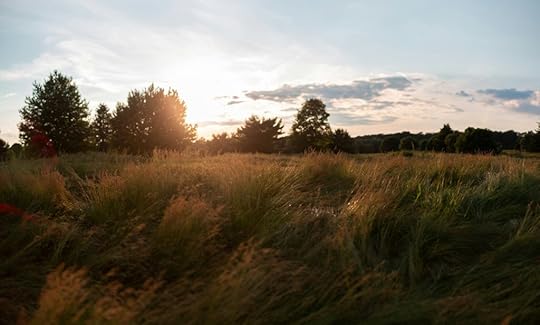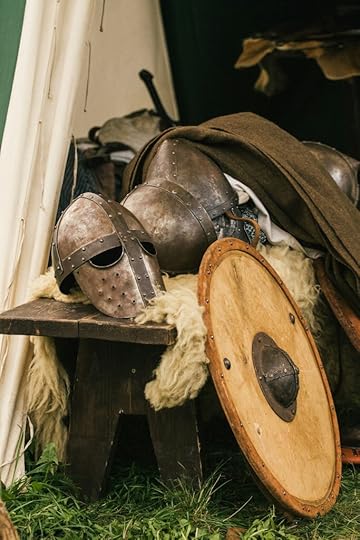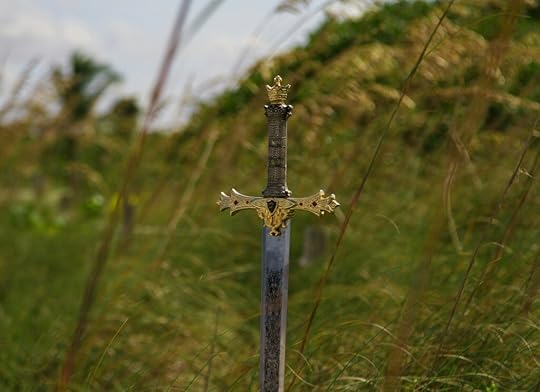Adam Fenner's Blog, page 22
October 3, 2024
Nefarious War
Li Bai
Translated from the Chinese by Shigeyoshi Obata
Last year we fought by the head-stream of the So-Kan,
This year we are fighting on the Tsung-ho road.
We have washed our armor in the waves of the Chiao-chi lake,
We have pastured our horses on Tien-shan’s snowy slopes.
The long, long war goes on ten thousand miles from home.
Our three armies are worn and grown old.
The barbarian does man-slaughter for plowing;
On his yellow sand-plains nothing has been seen but blanched skulls and bones.
Where the Chin emperor built the walls against the Tartars,
There the defenders of Han are burning beacon fires.
The beacon fires burn and never go out.
There is no end to war!–
In the battlefield men grapple each other and die;
The horses of the vanquished utter lamentable cries to heaven,
While ravens and kites peck at human entrails,
Carry them up in their flight, and hang them on the branches of dead trees.
So, men are scattered and smeared over the desert grass,
And the generals have accomplished nothing.
Oh, nefarious war! I see why arms
Were so seldom used by the benign sovereigns.
Written around 750 AD, an expression of the absurdity of war. Li Bai was no stranger to war. Having fought himself.
Every day I select a war poem, and respond to it, generally in poetic form. But perhaps not. Each poem grabs at something a little differently. Sometimes the themes blend together, sometimes they contradict. Many poets, were veterans themselves, others not. Their perspectives vary, and the poetry does in response. I’ll continue to do this as long as I keep finding poetry that explores novel or meaningful themes. You know, until the well runs dry.
Trusted enemies
It is good to see you, old friend
We’ve grown, tired and wary
Together, on these battlefields
Trusted enemies, thrust forward
We won’t share a beer, or chai
Nor tell our children, these stories
We both know why we are here
I wish you well, but duty calls
Maligned sovereigns, wield us
Weapons and arms, for means
Ends and goals, unknown, obscured
Benign sovereigns, would offer a drink

Photo by benjamin lehman on Unsplash
October 2, 2024
國殤 HYMN TO THE FALLEN
Jiu Ge
Translated by David Hawkes
操吳戈兮被犀甲, 車錯轂兮短兵接。
Grasping our great shields and wearing our hide armor
Wheel-hub to wheel-hub locked, we battle hand to hand.
旌蔽日兮敵若雲, 矢交墜兮士爭先。
Our banners darken the sky; the enemy teem like clouds:
Through the hail of arrows the warriors press forward.
凌餘陣兮躐餘行, 左驂殪兮右刃傷。
They dash on our lines; they trample our ranks down.
The left horse has fallen, the right one is wounded.
霾兩輪兮縶四馬, 援玉枹兮擊鳴鼓。
The wheels are embedded, the foursome entangled:
Seize the jade drumstick and beat the sounding drum!
天時懟兮威靈怒, 嚴殺盡兮棄原野。
The time is against us: the gods are angry.
Now all lie dead, left on the field of battle.
出不入兮往不反, 平原忽兮路超遠。
They went out never more to return:
Far, far away they lie, on the level plain,
帶長劍兮挾秦弓, 首身離兮心不懲。
Their long swords at their belts, clasping their Qin bows,
Head from body sundered: but their hearts could not be vanquished.
誠既勇兮又以武, 終剛強兮不可凌。
Both truly brave and also truly noble;
Strong to the last, they could not be dishonored.
身既死兮神以靈, 魂魄毅兮爲鬼雄。
Their bodies may have died, but their souls are living:
Heroes among the shades their valiant souls will be.
The translator David Hawkes said of the poem that it ‘is surely one of the most beautiful laments for fallen soldiers in any language.’
Every day I select a war poem, and respond to it, generally in poetic form. But perhaps not. Each poem grabs at something a little differently. Sometimes the themes blend together, sometimes they contradict. Many poets, were veterans themselves, others not. Their perspectives vary, and the poetry does in response. I’ll continue to do this as long as I keep finding poetry that explores novel or meaningful themes. You know, until the well runs dry.
Given
A man, goat, boy, tree, RPG, cows are big, a fifty cal is big
Herringbone positioned, wheels turned, observe and report
Silence torn by subsonic crack, bullet rips peaceful air and flesh
Overwhelming reply machine guns shred hillsides, dust
Armor faces front, back, a noggin cap, shrapnel adapted
Enemy ghosts, spotting gusts of wind at visions edge
Medics run, casualties call, brother’s gasp, bloody breath
Stop the bleeding, airway, breathing, we shared breakfast today
Sergeant’s cry havoc, direction, distance, destruction
Big brother’s rage, blood for blood, violence answered violently
Casualty evac, helicopter blades rhythmic thrumming
Dismount, battle damage assessment, report, return to base
Wipe down the turret, inventory his room, Chaplain’s offerings
No greater love…No one could take…What was not freely given…

Photo by Johann Siemens on Unsplash
October 1, 2024
Fragment 5
Archilochus
Ἀσπίδι μὲν Σαΐων τις ἀγάλλεται, ἥν παρὰ θάμνῳἔντος ἀμώμητον κάλλιπον οὐκ ἐθέλων·
αὐτὸν δ’ ἔκ μ’ ἐσάωσα· τί μοι μέλει ἀσπὶς ἐκείνη;
Ἐρρέτω· ἐξαῦτις κτήσομαι οὐ κακίω.
One of the Saians (Thracian tribe) now delights in the shield I discarded
Unwillingly near a bush, for it was perfectly good,
But at least I got myself safely out. Why should I care for that shield?
Let it go. Some other time I’ll find another no worse.
Translated by Douglas Gerber, 1999
The works of Archilochus, are viewed as famous by Greeks and even Romans as the works of Homer. The above poem was so famous that it became a connecting thread for latin poets for hundreds of years. In a world of Homeric heroes, many famous poets would make reference to throwing away their shields.
Every day I select a war poem, and respond to it, generally in poetic form. But perhaps not. Each poem grabs at something a little differently. Sometimes the themes blend together, sometimes they contradict. Many poets, were veterans themselves, others not. Their perspectives vary, and the poetry does in response. I’ll continue to do this as long as I keep finding poetry that explores novel or meaningful themes. You know, until the well runs dry.
My rifle, my weapon
One mind, any weapon
Am I, or this, my rifle
These hands awaken, eyes divine
Shoulders direct, feet obtain
My target, a target, any target
This rifle, any rifle, any gun, or blade
Mind concedes, grasp hold, my hands
Assault, defend, target acquisition
Similar result, central point penetrates
Bludgeons, eviscerates, eliminates
Armorer delivers tools, to weapons
Cold steel, to ready minds, steady hands
Wield violence, force, hostiles eliminated
Armorer inspects, tags, weapons returned

Photo by Elimende Inagella on Unsplash
September 30, 2024
Fragment 114
Archilochus

I don’t like a general
who towers over the troops,
lordly with elegant locks
and trim mustachios.
Give me a stumpy soldier
glaringly bowlegged,
yet rockfirm on his feet,
and in his heart a giant.
Translated by William Barnstone 1988.
Every day I select a war poem, and respond to it, generally in poetic form. But perhaps not. Each poem grabs at something a little differently. Sometimes the themes blend together, sometimes they contradict. Many poets, were veterans themselves, others not. Their perspectives vary, and the poetry does in response. I’ll continue to do this as long as I keep finding poetry that explores novel or meaningful themes. You know, until the well runs dry.
Poster child
He’s beautiful, in his war paint
Better suited for a recruiting poster
Strong jawed, broad shouldered
A firm grip, and glowering eyes
No use for this one, or his photoshoot
Rising out of the water, for a cameraman
We need gravel in their guts
A pot belly, and a strong back
And something, the camera can’t see

IMAGE: 1990s USMC Recruiting Poster
September 29, 2024
Hell’s Pavement
John Masefield
“When I’m discharged at Liverpool ‘n’ draws my bit o’ pay,
I won’t come to sea no more;
I’ll court a pretty little lass ‘n’ have a weddin’ day,
‘N’ settle somewhere down shore;
I’ll never fare to sea again a-temptin’ Davy Jones,
A-hearkening to the cruel sharks a-hungerin’ for my bones;
I’ll run a blushin’ dairy-farm or go a-crackin’ stones,
Or buy ‘n’ keep a little liquor-store”
So he said.
They towed her in to Liverpool, we made the hooker fast,
And the copper-bound official paid the crew,
And Billy drew his money, but the money didn’t last,
For he painted the alongshore blue,
It was rum for Poll, and rum for Nan, and gin for Jolly Jack;
He shipped a week later in the clothes upon his back;
He had to pinch a little straw, he had to beg a sack
To sleep on, when his watch was through,
So he did.
I enjoyed this piece enough, it captures something youthful and enduring about the military culture that I struggled to respond to the piece in a way that added something new and unique. Honestly, how do you top the honesty of a surly sailor ready to leave, who blows his money at the bar and returns a week later with nothing but the shirt on his back?
Every day I select a war poem, and respond to it, generally in poetic form. But perhaps not. Each poem grabs at something a little differently. Sometimes the themes blend together, sometimes they contradict. Many poets, were veterans themselves, others not. Their perspectives vary, and the poetry does in response. I’ll continue to do this as long as I keep finding poetry that explores novel or meaningful themes. You know, until the well runs dry.
Ol’ Sarg’s Speech
Save the speech ol’ Sarg’
I’m through, I’m done
You won’t retain,
Not me, I’m done
I’ve done my time
It’s true, I’m through
Paid my dues,
I did, I’m done
A bonus, you say
I’d listen, it’s true
Perhaps, maybe
It’s true, I could do
What’s a few more years
I may not be done, it’s true

Photo by Adrien Olichon on Unsplash
September 28, 2024
The Colored Soldiers
Paul Laurence Dunbar
If the muse were mine to tempt it
And my feeble voice were strong,
If my tongue were trained to measures,
I would sing a stirring song.
I would sing a song heroic
Of those noble sons of Ham,
Of the gallant colored soldiers
Who fought for Uncle Sam!
In the early days you scorned them,
And with many a flip and flout
Said “These battles are the white man’s,
And the whites will fight them out.”
Up the hills you fought and faltered,
In the vales you strove and bled,
While your ears still heard the thunder
Of the foes’ advancing tread.
Then distress fell on the nation,
And the flag was drooping low;
Should the dust pollute your banner?
No! the nation shouted, No!
So when War, in savage triumph,
Spread abroad his funeral pall—
Then you called the colored soldiers,
And they answered to your call.
And like hounds unleashed and eager
For the life blood of the prey,
Spring they forth and bore them bravely
In the thickest of the fray.
And where’er the fight was hottest,
Where the bullets fastest fell,
There they pressed unblanched and fearless
At the very mouth of hell.
Ah, they rallied to the standard
To uphold it by their might;
None were stronger in the labors,
None were braver in the fight.
From the blazing breach of Wagner
To the plains of Olustee,
They were foremost in the fight
Of the battles of the free.
And at Pillow! God have mercy
On the deeds committed there,
And the souls of those poor victims
Sent to Thee without a prayer.
Let the fulness of Thy pity
O’er the hot wrought spirits sway
Of the gallant colored soldiers
Who fell fighting on that day!
Yes, the Blacks enjoy their freedom,
And they won it dearly, too;
For the life blood of their thousands
Did the southern fields bedew.
In the darkness of their bondage,
In the depths of slavery’s night,
Their muskets flashed the dawning,
And they fought their way to light.
They were comrades then and brothers.
Are they more or less to-day?
They were good to stop a bullet
And to front the fearful fray.
They were citizens and soldiers,
When rebellion raised its head;
And the traits that made them worthy,—
Ah! those virtues are not dead.
They have shared your nightly vigils,
They have shared your daily toil;
And their blood with yours commingling
Has enriched the Southern soil.
They have slept and marched and suffered
‘Neath the same dark skies as you,
They have met as fierce a foeman,
And have been as brave and true.
And their deeds shall find a record
In the registry of Fame;
For their blood has cleansed completely
Every blot of Slavery’s shame.
So all honor and all glory
To those noble sons of Ham—
The gallant colored soldiers
Who fought for Uncle Sam!
I normally shy away from longer pieces, but Dunbar’s work earned the right to have every syllable heard.
Nothing I’ll be able to write can punch as hard as Dunbar. But I’ll make a modest attempt, from a limited perspective.
Every day I select a war poem, and respond to it, generally in poetic form. But perhaps not. Each poem grabs at something a little differently. Sometimes the themes blend together, sometimes they contradict. Many poets, were veterans themselves, others not. Their perspectives vary, and the poetry does in response. I’ll continue to do this as long as I keep finding poetry that explores novel or meaningful themes. You know, until the well runs dry.
The color green
I’d never seen this woodland green
Blended digital, square printed
Hues dark and light blended
Spectrum, intentional design
Crisp, clean, we formed up
Our skivvies standing, squared
Formation stripped bare
Skin deep, shoulder to shoulder
Now you all wear green
The only color you will see
Each a different shade
All the same formation

Photo by Samuel Ferrara on Unsplash
September 27, 2024
A Nameless Grave
Henry Wadsworth Longfellow
“A soldier of the Union mustered out,”
Is the inscription on an unknown grave
At Newport News, beside the salt-sea wave,
Nameless and dateless; sentinel or scout
Shot down in skirmish, or disastrous rout
Of battle, when the loud artillery drave
Its iron wedges through the ranks of brave
And doomed battalions, storming the redoubt.
Thou unknown hero sleeping by the sea
In thy forgotten grave! with secret shame
I feel my pulses beat, my forehead burn,
When I remember thou hast given for me
All that thou hadst, thy life, thy very name,
And I can give thee nothing in return.
Every day I select a war poem, and respond to it, generally in poetic form. But perhaps not. Each poem grabs at something a little differently. Sometimes the themes blend together, sometimes they contradict. Many poets, were veterans themselves, others not. Their perspectives vary, and the poetry does in response. I’ll continue to do this as long as I keep finding poetry that explores novel or meaningful themes. You know, until the well runs dry.
Stories lost
“A soldier of the Union mustered out,”
Unknown, unnamed soldier lies
Untold stories, for unknown ears
A mother, father, sister, wife
Your…He…Until the end…we are…
Sorry for your loss.
Rousing laughter, brothers banter
I can’t believe you…And then we…
They almost got us…But then you…
No, that was you…No, remember we…
Never forget.

Photo by Patrick Fore on Unsplash
September 26, 2024
Battle of Maldon (excerpt, again)
Author unknown
There was a crashing of shields. Seafarers came forth
enraged in the fight; the spear often went right through
the life-houses of the fated. Then Wystan went forth,
Thurstan’s son, he fought against the warriors—
he was in the press, the killer of three of them,
before Wigelin’s son lay dead among the slain.
There was a stern moot there. They stood fast,
warriors in the warfare, warriors perishing,
warriors wearied by wounds.
The slain fell to the earth. (296-303)
Oswold and Eadwold all the while
both of them brothers, encouraged the warriors,
their friendly companions they urged with their words
that they must endure there in their need,
not weakly, using their weapons. (304-8)
Bryhtwold spoke out, heaving his shield
(he was an old comrade), brandishing his spear;
very boldly he advised the warriors:
“Resolution should be the tougher, keener the heart,
the mind should be greater when our power diminishes.
Here lies our lord, all chopped up,
a good man on the gravel. He will always regret it,
he who thinks to turn away from this war-play.
I am old in life—I don’t wish to wander away,
but I’m going to lie down by the side of my lord,
beside these beloved men.” (309-19)
Written about the battle of Maldon, which took place on August 10-11 991 CE. From the perspective of the Anglo-Saxons. The battle was between the England and the vikings, to oversimplify it. Both the poem’s beginning and ending are lost.
There are always a lot of themes to play with. Many not the intention of the author of the time. But there is something about the expectation of service in this.
Every day I select a war poem, and respond to it, generally in poetic form. But perhaps not. Each poem grabs at something a little differently. Sometimes the themes blend together, sometimes they contradict. Many poets, were veterans themselves, others not. Their perspectives vary, and the poetry does in response. I’ll continue to do this as long as I keep finding poetry that explores novel or meaningful themes. You know, until the well runs dry.
Service obligation, privilege
This privilege, obligation, you’ll regret
Lay down your life, lay down beside
Lay down your children, grandchildren
Set them aside, and choose honor
Beside your lord, your country, for
Duty and honor, service, show them
You are of greater heart, stronger
Mettle, chopped up in this gravel
Set aside your selfishness, desires
A soft kiss, a lover’s warm hands
A child’s laughter, fails to compare
To a good man on the cold gravel

Photo by Dylan Freedom on Unsplash
September 25, 2024
Battle of Maldon (excerpt)
Author unknown
There was a crashing of shields. Seafarers came forth
enraged in the fight; the spear often went right through
the life-houses of the fated. Then Wystan went forth,
Thurstan’s son, he fought against the warriors—
he was in the press, the killer of three of them,
before Wigelin’s son lay dead among the slain.
There was a stern moot there. They stood fast,
warriors in the warfare, warriors perishing,
warriors wearied by wounds.
The slain fell to the earth. (296-303)
Oswold and Eadwold all the while
both of them brothers, encouraged the warriors,
their friendly companions they urged with their words
that they must endure there in their need,
not weakly, using their weapons. (304-8)
Bryhtwold spoke out, heaving his shield
(he was an old comrade), brandishing his spear;
very boldly he advised the warriors:
“Resolution should be the tougher, keener the heart,
the mind should be greater when our power diminishes.
Here lies our lord, all chopped up,
a good man on the gravel. He will always regret it,
he who thinks to turn away from this war-play.
I am old in life—I don’t wish to wander away,
but I’m going to lie down by the side of my lord,
beside these beloved men.” (309-19)
Written about the battle of Maldon, which took place on August 10-11 991 CE. From the perspective of the Anglo-Saxons. The battle was between the England and the vikings, to oversimplify it. Both the poem’s beginning and ending are lost.
There are always a lot of themes to play with. Many not the intention of the author of the time. But there is something striking about a speech about a dead lord, who lead his people to battle…
Every day I select a war poem, and respond to it, generally in poetic form. But perhaps not. Each poem grabs at something a little differently. Sometimes the themes blend together, sometimes they contradict. Many poets, were veterans themselves, others not. Their perspectives vary, and the poetry does in response. I’ll continue to do this as long as I keep finding poetry that explores novel or meaningful themes. You know, until the well runs dry.
Civilized age
Time, technology, enlightened philosophy
History and education has civilized us
Far and away from the nobles and peasantry
Class division, social hierarchy, unpleasantry
Wars professionalized, recruited masses
A choice, volunteering after benefits review
Only the fittest to fight, a youthful endeavor
Retire young, with a modest pension paid
Presidential administration, war persecuted
A written dictate, leadership suited at a desk
Politicians bluster, rally inspiration, lead voters
Appoint generals for war, aged administrators
A civilized age, experience comfort, please vote
Deploy the young, better equipped and funded
Experience guilt, wave goodbye, read the news
We don’t risk our leaders, don’t wander away
Author’s note: I’ll probably rewrite this one. The more I think about this topic the more it irritates me.

Photo by Ricardo Cruz on Unsplash
September 24, 2024
Break of Day in the Trenches
Isaac Rosenberg
The darkness crumbles away.
It is the same old druid Time as ever,
Only a live thing leaps my hand,
A queer sardonic rat,
As I pull the parapet’s poppy
To stick behind my ear.
Droll rat, they would shoot you if they knew
Your cosmopolitan sympathies.
Now you have touched this English hand
You will do the same to a German
Soon, no doubt, if it be your pleasure
To cross the sleeping green between.
It seems you inwardly grin as you pass
Strong eyes, fine limbs, haughty athletes,
Less chanced than you for life,
Bonds to the whims of murder,
Sprawled in the bowels of the earth,
The torn fields of France.
What do you see in our eyes
At the shrieking iron and flame
Hurled through still heavens?
What quaver—what heart aghast?
Poppies whose roots are in man’s veins
Drop, and are ever dropping;
But mine in my ear is safe—
Just a little white with the dust.
Every day I select a war poem, and respond to it, generally in poetic form. But perhaps not. Each poem grabs at something a little differently. Sometimes the themes blend together, sometimes they contradict. Many poets, were veterans themselves, others not. Their perspectives vary, and the poetry does in response. I’ll continue to do this as long as I keep finding poetry that explores novel or meaningful themes. You know, until the well runs dry.
The sun shines
Overhead the sun shines
Cuts through the smoke
Soot and sand, golden light
Draws sweat, collecting
in our chin straps, glaring
Dragonfly wings beat past
Silent trails between us
Soft landing on rifle stock
Antennae flitter about
Does it taste gunpowder
The quiet moment, after
Bullets penetrate morning
Air, or him. It didn’t offer
Warning, to either side
Silently departing




